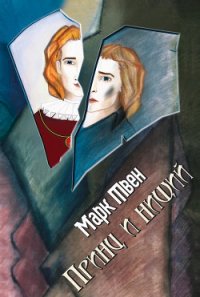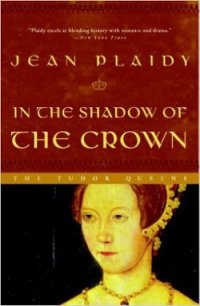The Prince and the Pauper / Принц и нищий. Книга для чтения на английском языке - Твен Марк (читать книги онлайн бесплатно полностью без сокращений TXT) 📗
“The King is dead!”
The great assemblage bent their heads upon their breasts with one accord; remained so, in profound silence, a few moments; then all sank upon their knees in a body [83], stretched out their hands toward Tom, and a mighty shout burst forth that seemed to shake the building —
“Long live the King!”
Poor Tom’s dazed eyes wandered abroad over this stupefying spectacle, and finally rested dreamily upon the kneeling princesses beside him, a moment, then upon the Earl of Hertford. A sudden purpose dawned in his face. He said, in a low tone, at Lord Hertford’s ear —
“Answer me truly, on thy faith and honour! Uttered I here a command, the which none but a king might hold privilege and prerogative to utter, would such commandment be obeyed, and none rise up to say me nay?”
“None, my liege, in all these realms. In thy person bides the majesty of England. [84] Thou art the king – thy word is law.”
Tom responded, in a strong, earnest voice, and with great animation —
“Then shall the king’s law be law of mercy, from this day, and never more be law of blood! Up from thy knees and away! To the Tower, and say the King decrees the Duke of Norfolk shall not die!”
The words were caught up and carried eagerly from lip to lip far and wide over the hall, and as Hertford hurried from the presence, another prodigious shout burst forth —
“The reign of blood is ended! Long live Edward, King of England!”
Chapter XII
The Prince and His Deliverer
As soon as Miles Hendon and the little prince were clear of the mob, they struck down through back lanes and alleys toward the river. Their way was unobstructed until they approached London Bridge; then they ploughed into the multitude again [85], Hendon keeping a fast grip upon the Prince’s – no, the King’s – wrist. The tremendous news was already abroad, and the boy learned it from a thousand voices at once – “The King is dead!” The tidings struck a chill to the heart of the poor little waif, and sent a shudder through his frame. He realised the greatness of his loss, and was filled with a bitter grief; for the grim tyrant who had been such a terror to others had always been gentle with him. The tears sprang to his eyes and blurred all objects. For an instant he felt himself the most forlorn, outcast, and forsaken of God’s creatures – then another cry shook the night with its far-reaching thunders: “Long live King Edward the Sixth!” and this made his eyes kindle, and thrilled him with pride to his fingers’ ends. “Ah,” he thought, “how grand and strange it seems – I am King!”
Our friends threaded their way slowly through the throngs upon the bridge. This structure, which had stood for six hundred years, and had been a noisy and populous thoroughfare all that time, was a curious affair, for a closely packed rank of stores and shops, with family quarters overhead, stretched along both sides of it, from one bank of the river to the other. The Bridge was a sort of town to itself; it had its inn, its beer-houses, its bakeries, its haberdasheries, its food markets, its manufacturing industries, and even its church. It looked upon the two neighbours which it linked together – London and Southwark – as being well enough as suburbs, but not otherwise particularly important. It was a close corporation, so to speak; it was a narrow town, of a single street a fifth of a mile long, its population was but a village population and everybody in it knew all his fellow-townsmen intimately, and had known their fathers and mothers before them – and all their little family affairs into the bargain [86]. It had its aristocracy, of course – its fine old families of butchers, and bakers, and what-not, who had occupied the same old premises for five or six hundred years, and knew the great history of the Bridge from beginning to end, and all its strange legends; and who always talked bridgy talk, and thought bridgy thoughts, and lied in a long, level, direct, substantial bridgy way. It was just the sort of population to be narrow and ignorant and self-conceited. Children were born on the Bridge, were reared there, grew to old age, and finally died without ever having set a foot upon any part of the world but London Bridge alone. Such people would naturally imagine that the mighty and interminable procession which moved through its street night and day, with its confused roar of shouts and cries, its neighings and bellowing and bleatings and its muffled thunder-tramp, was the one great thing in this world, and themselves somehow the proprietors of it. And so they were, in effect – at least they could exhibit it from their windows, and did – for a consideration [87] – whenever a returning king or hero gave it a fleeting splendour, for there was no place like it for affording a long, straight, uninterrupted view of marching columns.
Конец ознакомительного фрагмента.
Текст предоставлен ООО «ЛитРес».
Прочитайте эту книгу целиком, купив полную легальную версию на ЛитРес.
Безопасно оплатить книгу можно банковской картой Visa, MasterCard, Maestro, со счета мобильного телефона, с платежного терминала, в салоне МТС или Связной, через PayPal, WebMoney, Яндекс.Деньги, QIWI Кошелек, бонусными картами или другим удобным Вам способом.
“Long live the King!”
Poor Tom’s dazed eyes wandered abroad over this stupefying spectacle, and finally rested dreamily upon the kneeling princesses beside him, a moment, then upon the Earl of Hertford. A sudden purpose dawned in his face. He said, in a low tone, at Lord Hertford’s ear —
“Answer me truly, on thy faith and honour! Uttered I here a command, the which none but a king might hold privilege and prerogative to utter, would such commandment be obeyed, and none rise up to say me nay?”
“None, my liege, in all these realms. In thy person bides the majesty of England.[84] Thou art the king – thy word is law.”
Tom responded, in a strong, earnest voice, and with great animation —
“Then shall the king’s law be law of mercy, from this day, and never more be law of blood! Up from thy knees and away! To the Tower, and say the King decrees the Duke of Norfolk shall not die!”
The words were caught up and carried eagerly from lip to lip far and wide over the hall, and as Hertford hurried from the presence, another prodigious shout burst forth —
“The reign of blood is ended! Long live Edward, King of England!”
Chapter XII
The Prince and His Deliverer
As soon as Miles Hendon and the little prince were clear of the mob, they struck down through back lanes and alleys toward the river. Their way was unobstructed until they approached London Bridge; then they ploughed into the multitude again[85], Hendon keeping a fast grip upon the Prince’s – no, the King’s – wrist. The tremendous news was already abroad, and the boy learned it from a thousand voices at once – “The King is dead!” The tidings struck a chill to the heart of the poor little waif, and sent a shudder through his frame. He realised the greatness of his loss, and was filled with a bitter grief; for the grim tyrant who had been such a terror to others had always been gentle with him. The tears sprang to his eyes and blurred all objects. For an instant he felt himself the most forlorn, outcast, and forsaken of God’s creatures – then another cry shook the night with its far-reaching thunders: “Long live King Edward the Sixth!” and this made his eyes kindle, and thrilled him with pride to his fingers’ ends. “Ah,” he thought, “how grand and strange it seems – I am King!”
Our friends threaded their way slowly through the throngs upon the bridge. This structure, which had stood for six hundred years, and had been a noisy and populous thoroughfare all that time, was a curious affair, for a closely packed rank of stores and shops, with family quarters overhead, stretched along both sides of it, from one bank of the river to the other. The Bridge was a sort of town to itself; it had its inn, its beer-houses, its bakeries, its haberdasheries, its food markets, its manufacturing industries, and even its church. It looked upon the two neighbours which it linked together – London and Southwark – as being well enough as suburbs, but not otherwise particularly important. It was a close corporation, so to speak; it was a narrow town, of a single street a fifth of a mile long, its population was but a village population and everybody in it knew all his fellow-townsmen intimately, and had known their fathers and mothers before them – and all their little family affairs into the bargain[86]. It had its aristocracy, of course – its fine old families of butchers, and bakers, and what-not, who had occupied the same old premises for five or six hundred years, and knew the great history of the Bridge from beginning to end, and all its strange legends; and who always talked bridgy talk, and thought bridgy thoughts, and lied in a long, level, direct, substantial bridgy way. It was just the sort of population to be narrow and ignorant and self-conceited. Children were born on the Bridge, were reared there, grew to old age, and finally died without ever having set a foot upon any part of the world but London Bridge alone. Such people would naturally imagine that the mighty and interminable procession which moved through its street night and day, with its confused roar of shouts and cries, its neighings and bellowing and bleatings and its muffled thunder-tramp, was the one great thing in this world, and themselves somehow the proprietors of it. And so they were, in effect – at least they could exhibit it from their windows, and did – for a consideration[87] – whenever a returning king or hero gave it a fleeting splendour, for there was no place like it for affording a long, straight, uninterrupted view of marching columns.
Конец ознакомительного фрагмента.
Текст предоставлен ООО «ЛитРес».
Прочитайте эту книгу целиком, Купить полную версию книги



